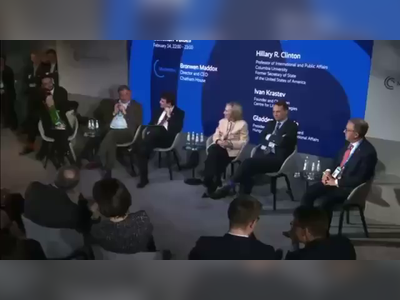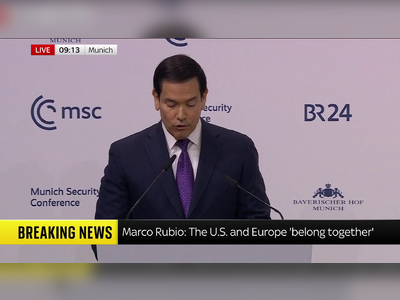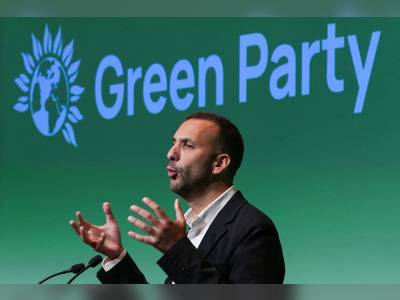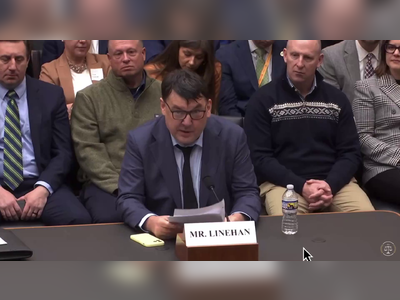Germany's New Defense Spending Plan Signals Shift in European Security Posture
Friedrich Merz announces a substantial financial package aimed at enhancing Germany's defense and infrastructure in anticipation of parliamentary support.
Friedrich Merz, the leader of Germany's conservative Christian Democratic Union (CDU), has secured a significant financial package targeting defense and infrastructure ahead of a critical parliamentary vote scheduled for next Tuesday.
Following his party's electoral victory last month, Merz emphasized that reinforcing Europe's security is a top priority, particularly in light of shifting attitudes from the United States under President Donald Trump.
After ten hours of discussions with the Greens, Merz articulated that the agreement sends a clear message to Germany's allies: 'Germany is back.' He asserted that Germany is making a substantial contribution to the defense of freedom and peace in Europe.
Merz is anticipated to become the next Chancellor after campaigning on a platform of stronger European defense capabilities.
The proposed initiative seeks to increase defense expenditure to over one percent of Germany's GDP, alongside substantial investments in infrastructure, civil protection, and intelligence services.
A specialized infrastructure fund of €500 billion has been proposed to facilitate additional investments over the next decade, including €100 billion designated for climate change initiatives.
Furthermore, Germany's 16 federal states would be allowed to borrow up to 0.35 percent of GDP above the debt brake limit.
Under the plans, expenditures related to aiding states 'attacked by violations of international law' would be exempt from the debt constraints, enabling outgoing Chancellor Olaf Scholz to approve €3 billion in aid for Ukraine as early as next week.
The previous German government collapsed in late 2024 due to disagreements regarding the relaxation of the debt limits imposed by former Chancellor Angela Merkel’s administration during the 2009 financial crisis.
This led to restrictions that limited borrowing to 0.35 percent of GDP, resulting in infrastructure deterioration as railways and bridges suffered from years of insufficient investment.
Lars Klingbeil, leader of the Social Democratic Party (SPD), stated that Friday's agreement sends a 'historic signal' that will strengthen Germany and enhance its role in Europe.
Despite the Greens’ previous participation in the government, they will not be part of Merz's coalition; however, officials within the party expressed enthusiasm for the investment in climate change initiatives.
Outgoing Foreign Minister Annalena Baerbock welcomed the proposed defense package, noting that it not only makes Germany safer but also sends a 'clear signal to Ukraine, Europe, and the world.' She emphasized Germany's historical responsibility during turbulent times.
Conversely, co-leader of the far-right Alternative for Germany (AfD), Alice Weidel, criticized Merz's plan, accusing him of operating outside the constitutional framework and placing an undue financial burden on future generations.
She described the proposal as a 'financial coup.'
The forthcoming parliamentary session may encounter resistance as both the AfD and the Left party have called for a postponement of next week's session, which the Constitutional Court denied.
With both the Greens and the SPD's backing, Merz's proposal should secure the necessary majority in the current parliament before the newly elected members take their seats in the Bundestag on March 25.
Following his party's electoral victory last month, Merz emphasized that reinforcing Europe's security is a top priority, particularly in light of shifting attitudes from the United States under President Donald Trump.
After ten hours of discussions with the Greens, Merz articulated that the agreement sends a clear message to Germany's allies: 'Germany is back.' He asserted that Germany is making a substantial contribution to the defense of freedom and peace in Europe.
Merz is anticipated to become the next Chancellor after campaigning on a platform of stronger European defense capabilities.
The proposed initiative seeks to increase defense expenditure to over one percent of Germany's GDP, alongside substantial investments in infrastructure, civil protection, and intelligence services.
A specialized infrastructure fund of €500 billion has been proposed to facilitate additional investments over the next decade, including €100 billion designated for climate change initiatives.
Furthermore, Germany's 16 federal states would be allowed to borrow up to 0.35 percent of GDP above the debt brake limit.
Under the plans, expenditures related to aiding states 'attacked by violations of international law' would be exempt from the debt constraints, enabling outgoing Chancellor Olaf Scholz to approve €3 billion in aid for Ukraine as early as next week.
The previous German government collapsed in late 2024 due to disagreements regarding the relaxation of the debt limits imposed by former Chancellor Angela Merkel’s administration during the 2009 financial crisis.
This led to restrictions that limited borrowing to 0.35 percent of GDP, resulting in infrastructure deterioration as railways and bridges suffered from years of insufficient investment.
Lars Klingbeil, leader of the Social Democratic Party (SPD), stated that Friday's agreement sends a 'historic signal' that will strengthen Germany and enhance its role in Europe.
Despite the Greens’ previous participation in the government, they will not be part of Merz's coalition; however, officials within the party expressed enthusiasm for the investment in climate change initiatives.
Outgoing Foreign Minister Annalena Baerbock welcomed the proposed defense package, noting that it not only makes Germany safer but also sends a 'clear signal to Ukraine, Europe, and the world.' She emphasized Germany's historical responsibility during turbulent times.
Conversely, co-leader of the far-right Alternative for Germany (AfD), Alice Weidel, criticized Merz's plan, accusing him of operating outside the constitutional framework and placing an undue financial burden on future generations.
She described the proposal as a 'financial coup.'
The forthcoming parliamentary session may encounter resistance as both the AfD and the Left party have called for a postponement of next week's session, which the Constitutional Court denied.
With both the Greens and the SPD's backing, Merz's proposal should secure the necessary majority in the current parliament before the newly elected members take their seats in the Bundestag on March 25.
AI Disclaimer: An advanced artificial intelligence (AI) system generated the content of this page on its own. This innovative technology conducts extensive research from a variety of reliable sources, performs rigorous fact-checking and verification, cleans up and balances biased or manipulated content, and presents a minimal factual summary that is just enough yet essential for you to function as an informed and educated citizen. Please keep in mind, however, that this system is an evolving technology, and as a result, the article may contain accidental inaccuracies or errors. We urge you to help us improve our site by reporting any inaccuracies you find using the "Contact Us" link at the bottom of this page. Your helpful feedback helps us improve our system and deliver more precise content. When you find an article of interest here, please look for the full and extensive coverage of this topic in traditional news sources, as they are written by professional journalists that we try to support, not replace. We appreciate your understanding and assistance.











